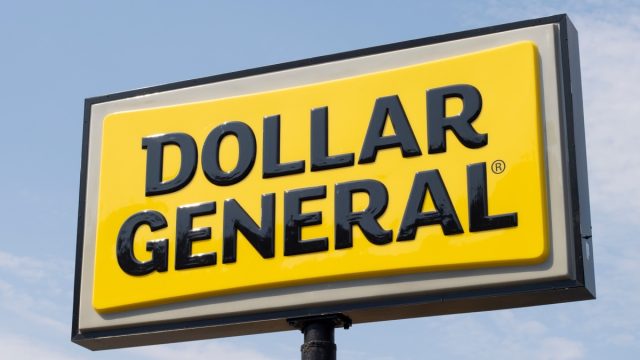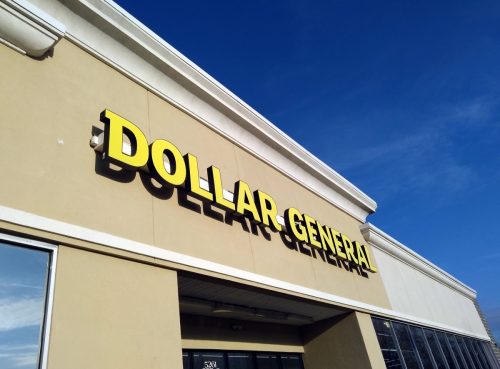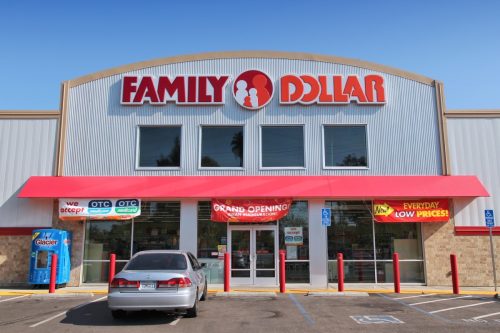Dollar General and Walmart Are Under Fire for Overcharging Customers Again

Once again, discount retailers are facing backlash for overcharging customers. This time, Walmart, Dollar General, and Family Dollar are taking the heat, with price scanner errors resulting in shoppers paying too much at the register. All three retailers have been around the block before when it comes to overcharging, but this time, they’re racking up substantial civil penalties. Read on to find out more about this ongoing issue, and how retailers are being punished.
READ THIS NEXT: Walmart Is Under Fire for Allegedly Double-Charging Customers Again.
Price scanner errors are a persistent issue.

The latest price discrepancies were cited by the North Carolina Department of Agriculture & Consumer Services (NCDA&CS), which conducts “periodic, unannounced inspections” of price scanners at different retailers.
During the inspections, prices on the shelves are compared with those at the register. If stores have an error rate over 2 percent resulting in overcharges, store management is notified, and a “more intensive” follow-up inspection is scheduled. Fines are applied if stores fail a follow-up, and they are reinspected every 60 days until the error rate is below 2 percent. The NCDA&CS also records undercharges, but those don’t count against retailers.
“Our Standards Division continues to see about a quarter of all price scanner inspections fail and many stores are failing multiple inspections,” Agriculture Commissioner Steve Troxler said in a Jan. 30 press release announcing the latest offenders.
“Overcharges cost consumers so we remain vigilant in inspecting stores in order to protect consumers. Remember it is always a good practice to check your receipt as well as the price on the shelf to make sure you are paying the correct amount and alert managers if the prices don’t match,” he concluded.
Dollar General was the biggest offender.

According to the Jan. 30 NCDA&CS press release, 52 stores in 33 North Carolina counties were fined in the fourth quarter of 2022. Of these stores, nearly half were Dollar General locations.
In total, Dollar General paid approximately $136,795 after price scanner errors were reported at 23 locations, with a single store in Moore County on the hook for a whopping $22,995. According to the press release, the store, which is on U.S. Highway 1, has failed six inspections since Nov. 2021.
Family Dollar was a close second, as 15 stores paid fines for overcharging. However, Family Dollar—which is owned by Dollar Tree—paid even more than Dollar General. In total, the retailer coughed up roughly $155,000, with fines ranging from $1,785 to $18,740.
RELATED: For more up-to-date information, sign up for our daily newsletter.
Walmart shelled out as well.

Price scanner errors were also detected at six North Carolina Walmart stores, per the NCDA&CS press release, with fines amounting to a grand total of $22,830. A Walmart Neighborhood Market, which is the retailer’s smaller store format, incurred the biggest fine of $12,000. Before it passed in Oct. 2022, the store had failed three NCDA&CS follow-up inspections.
Dollar General, Family Dollar, and Walmart weren’t the only retailers that paid up, however. Three Target stores, two Circle K convenience stores, one 7-Eleven, one Minuteman Food Mart, and independent grocery store Bryson City IGA were also flagged and fined.
Overcharging is widespread.

For its part, the NCDA&CS is consistent with its inspections. The agency cited issues at 70 stores in Dec. 2022 and 61 stores in Aug. 2022.
But in general, reports of big-name retailers overcharging aren’t anything new—and they certainly aren’t limited to North Carolina. The state of Ohio is leading a charge against dollar store chains, filing lawsuits against both Dollar General and Family Dollar for charging customers more at the register than the price listed on the shelf. Last week, Dollar General stores temporarily closed to re-tag their shelf prices, but officials said they aren’t backing down.
“Ohio’s Dollar General stores are shutting down to re-tag all their shelf prices—exactly the reason we sued them,” Ohio Attorney General Dave Yost tweeted on Jan. 27. “Glad to see this first step—but we are going to insist on the court order to enforce continued compliance with Ohio’s market fairness laws.”
Walmart, too, faced backlash last month in Ohio. On Jan. 13, a class-action lawsuit for fraud was filed against the retailer, with Kevin Adelstein, of Moreland Hills, Ohio, alleging that product prices are different in stores and online. In Dec. 2022, Walmart also admitted that it accidentally “charged certain customers twice” due to an issue with the payment processor used in credit and debit card transactions.